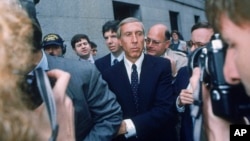Ivan F. Boesky, the flamboyant stock trader whose cooperation with the government cracked open one of the largest insider trading scandals in the history of Wall Street, has died at the age of 87.
A representative at the Marianne Boesky Gallery, owned by Ivan Boesky's daughter, confirmed his death. No other details were given.
The son of a Detroit delicatessen owner, Boesky was once considered one of the richest and most influential risk-takers on Wall Street. He had parlayed $700,000 from his late mother-in-law's estate into a fortune estimated at more than $200 million, hurtling him into the ranks of Forbes magazine's list of the 400 richest Americans.
Once implicated in insider trading, Boesky cooperated with a brash young U.S. attorney named Rudolph Giuliani in a bid for leniency, uncovering a scandal that shattered promising careers, blemished some of the most respected U.S. investment brokerages and injected a certain paranoia into the securities industry.
Working undercover, Boesky secretly taped three conversations with Michael Milken, the so-called "junk bond king" whose work with Drexel Burnham Lambert had revolutionized the credit markets. Milken eventually pleaded guilty to six felonies and served 22 months in prison, while Boesky paid a $100 million fine and spent 20 months in a minimum-security California prison nicknamed "Club Fed," beginning in March 1988.
After Boesky's arrest, accounts circulated widely that he had had told business students during a commencement address at the University of California at Berkeley in 1985 or 1986, "Greed is all right, by the way. I want you to know that. I think greed is healthy. You can be greedy and still feel good about yourself."
The line was memorably echoed by Michael Douglas in his Oscar-winning portrayal of Gordon Gekko, a high-flying trader, in Oliver Stone's 1987 film "Wall Street."
"The point is, ladies and gentlemen, that greed, for lack of a better word, is good," Douglas tells the shareholders of Teldar Paper. "Greed is right. Greed works. Greed clarifies, cuts through, and captures the essence of the evolutionary spirit."
Boesky, however, said he couldn't remember saying "greed is healthy" and denied another quotation attributed to him in the 1984 Atlantic Monthly, in which he allegedly said that climbing to the height of a huge pile of silver dollars would be "an aphrodisiac experience."
While he usually worked 18-hour days, the silver-haired and lean Boesky also lived a life of opulence. He wore designer clothes, traveled in limousines, private airplanes and helicopters and revamped his 10,000-square-foot Westchester County mansion with a Jeffersonian dome to resemble Monticello.
Boesky was an arbitrageur, a risk-taker who made millions by betting on stocks thought to be the target of corporate takeovers. But some of his tips came from within the mergers and acquisitions departments of Drexel Burnham Lambert Inc. and Kidder, Peabody & Co.
Dennis Levine of Drexel and Martin Siegal of Kidder, Peabody fed Boesky confidential information in return for a promised cut of profits of either 1% or 5%.
Boesky paid Siegal $700,000 in three installments, with a courier delivering briefcases full of cash at three clandestine meetings on a street corner and in the lobby of the Plaza Hotel in Manhattan. Boesky had made millions on Siegal's tips, which included word that Getty Oil and Carnation Co. were ripe for takeovers.
Levine was arrested before his payout could come, tripped up by his own insider trading. Facing harsh penalties under the government's racketeering statutes, Levine revealed everything and Boesky began talking as well, providing information leading to convictions or guilty pleas in cases involving former stockbroker Boyd Jefferies, Siegel, four executives of Britian's Guiness PLC, takeover strategist Paul Bilzerian, stock speculator Salim Lewis and others.
The most notable arrest was of Milken, the pioneering financier who had transformed capital markets in the 1970s with a new form of bond that allowed thousands of mid-sized companies to raise money.
In the 1980s those "junk" bonds were used to finance thousands of leveraged buyouts, including Revlon, Beatrice Companies, RJR Nabisco Inc. and Federated Department Stores, making Milken a hated and feared figure on Wall Street.
The financier and philanthropist was indicted on 98 counts, including securities and mail fraud, insider trading, racketeering and making false statements. Prosecutors said Milken and Boesky conspired together to manipulate securities prices, rig transactions and evade taxes and regulatory requirements.
Milken eventually pleaded guilty to six securities violations, including telling Boesky he'd cover any losses he suffered trading the stock of Fischbach Corp., a takeover target at the time.
Prosecutors said Boesky's cooperation provided the government with the most information about securities law violations since the legislative hearings that led to the 1933 and 1934 Securities Acts.
At his 1987 sentencing Boesky's lawyer quoted his psychiatrist as saying Boesky "has begun to recognize that he suffered from an abnormal and compulsive need to prove himself, to overcome some sense of inadequacy or inferiority that is rooted in his childhood."
Three years after his release from a Brooklyn halfway house in April 1990, Boesky and his wife Seema divorced after 30 years of marriage.
Claiming he had been left penniless after paying fines, restitution and legal fees, he won $20 million in cash and $180,000 a year in alimony from his wife's $100 million fortune. He also got a $2.5 million home in the La Jolla section of San Diego, where he lived with his boyhood friend, Houshang Wekili.
Ivan Frederick Boesky was born in Detroit in 1937 into a family of Russian Jewish immigrants. Boesky said he learned industriousness from his father, who operated three delicatessens.








